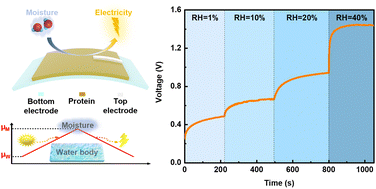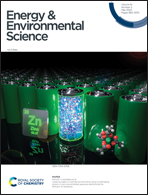Lab free protein-based moisture electric generators with a high electric output†
Abstract
Moisture-electric generators (MEGs), harvesting ubiquitous moisture from the environment for electricity generation, have attracted great interest as power supply devices. However, there are great challenges associated with material availability, fabrication accessibility and operation environment, which are key factors to achieve high output with low cost for practical applications, and a deeper understanding of the underlying mechanism of interactions between MEGs and water is urgently required. Here, a whey protein available in supermarkets is used to fabricate low-cost MEGs with controllable performance through tuning surface charges and hydrophilicity, which provides new insights into the electricity generation mechanism and large-scale application. The MEGs exhibit the highest voltage output of 1.45 V at a room humidity level of 40% relative humidity. The whey protein films possess the merits of low cost (70 times cheaper than commonly used polymers), being flexible and semi-transparent, and having self-healing ability, presenting excellent comprehensive device performance. Besides, MEGs can operate well at extreme temperatures (−20 °C or 50 °C) and power a location tracker in a desert with 26% relative humidity. The modified functional layers with selective ion absorption and controllable outputs provided a deeper understanding of electricity generation in MEGs and demonstrated great potential in powering a wide range of electronic devices in various dynamic environments with high sustainability and reliability.



 Please wait while we load your content...
Please wait while we load your content...